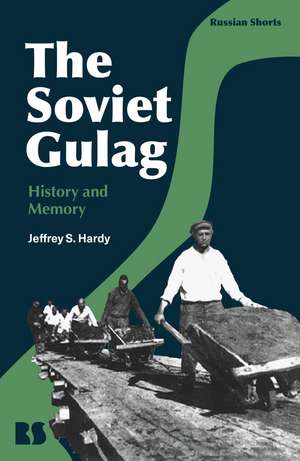The Soviet Gulag: History and Memory: Russian Shorts
Autor Associate Professor Jeffrey S. Hardyen Limba Engleză Paperback – 20 sep 2023
| Toate formatele și edițiile | Preț | Express |
|---|---|---|
| Paperback (1) | 86.39 lei 3-5 săpt. | +15.10 lei 4-10 zile |
| Bloomsbury Publishing – 20 sep 2023 | 86.39 lei 3-5 săpt. | +15.10 lei 4-10 zile |
| Hardback (1) | 316.72 lei 6-8 săpt. | |
| Bloomsbury Publishing – 20 sep 2023 | 316.72 lei 6-8 săpt. |
Preț: 86.39 lei
Preț vechi: 93.89 lei
-8% Nou
Puncte Express: 130
Preț estimativ în valută:
16.54€ • 17.97$ • 13.90£
16.54€ • 17.97$ • 13.90£
Carte disponibilă
Livrare economică 31 martie-14 aprilie
Livrare express 14-20 martie pentru 25.09 lei
Preluare comenzi: 021 569.72.76
Specificații
ISBN-13: 9781350128187
ISBN-10: 135012818X
Pagini: 144
Ilustrații: 10 bw illus
Dimensiuni: 129 x 198 x 25 mm
Greutate: 0.19 kg
Editura: Bloomsbury Publishing
Colecția Bloomsbury Academic
Seria Russian Shorts
Locul publicării:London, United Kingdom
ISBN-10: 135012818X
Pagini: 144
Ilustrații: 10 bw illus
Dimensiuni: 129 x 198 x 25 mm
Greutate: 0.19 kg
Editura: Bloomsbury Publishing
Colecția Bloomsbury Academic
Seria Russian Shorts
Locul publicării:London, United Kingdom
Caracteristici
Addresses both the intentions of administrators and the experience of inmates, as well as briefly discussing the main scholarly debates surrounding these issues
Notă biografică
Jeffrey S. Hardy is Associate Professor of History at Brigham Young University, USA. He is the author of The Gulag after Stalin: Redefining Punishment in Khrushchev's Soviet Union, 1953-1964 (2016).
Cuprins
List of FiguresPrefaceIntroduction1 Revolutionary Dreams and Early Soviet Confinement2 Building the Gulag3 Everyday Life in Stalin's Camps4 World War II and the Zenith of the Gulag System5 The Gulag After Stalin6 Remembering the Gulag and its VictimsNotesSelect BibliographyIndex
Recenzii
This concise history of the Gulag is the latest in Bloomsbury's excellent Russian Shorts series . Hardy's book is unique in that it examines the contested memory of the Gulag in the post-Soviet period, in particular the role played by politicians, NGOs and survivors, and he questions how state-sponsored monuments and museums commemorating Gulag victims can coexist alongside political repression in Russia today.















